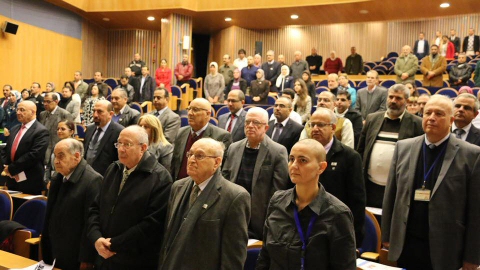The East Jerusalem Hospitals Network (EJHN) announced, during its 4th annual conference in Notre Dame of Jerusalem Center, plans to improve the entire health system in the city of Jerusalem.
The 2015 conference was held under the title “Challenges & Achievements”, and tackled major issues facing hospitals in Jerusalem, most notably relating to financial sustainability, increasing political encroachments on health services, and new ideas needed to enhance the quality of health services.
Participants at the conference expressed avid concern regarding Israel’s constant raids on hospitals in Jerusalem, and their continuous violations of human rights while risking the safety of patients. They also stressed the importance of integration between hospitals and medical centers in the city, to enable their stand against these assaults, and to route Jerusalem’s health system into a sustainable and comprehensive system of medical care.
The conference brought together EJHN hospital doctors with other international and local medical partners who are commitmed towards the improvement of the health sector in Jerusalem, and enhancing socio-economic conditions for Palestinian citizens in Jerusalem.
Adnan Husseini, the Governor of Jerusalem, represented Palestinian officialdom, while Mr. Ralph Tarraf, European Union Representative represented the EU countries, a main supporter of the health system in Jerusalem. The Ministry of Health was represented by Abd Al-Rahim Swisa, the Ministry of Health Representative and General Manager of West Bank’s Hospitals, in addition to Ameera Al-Hindi; Director of the Medical Referral Department.
“The provision of quality and accessible health care is a major challenge that we are facing. Nonetheless, hospitals of Jerusalem have shown great improvements; an integrated role between the Governorate of Jerusalem and Medical Institutions have made the choice to act and implement the most-far reaching structural reforms,” Adnan Al-Husseini assured the audience.
The conference discussed further ways to enhance the hospital network and connection between members in order to enable it to generate additional insights into optimal service capabilities to meet increasing patient needs.
Various calls for diversification in funding and income resources were emphasized as necessary in order for the hospital network remain viable and operational, and in order to continue to provide the best medical services for all patients of the Jerusalem vicinity, the West Bank and Gaza.
Stressing the same context, Abdel Qader Husseini, chairman of EJHN, alluded that the network is working on developing strategies and implementing reforms to improve funding, governance and the entire health services regime in Jerusalem, to place the health system in Jerusalem on a sustainable long-term track.
In turn, Mr. Taraff assured the audience that the European Union will continue its support to the health sector in Jerusalem, in order to deliver concrete benefit for the Palestinian community as a whole. He added that the EU is committed to improve the fiscal situation of the hospitals. “We encourage the management, employees and all stakeholders to cooperate together and continue their efforts in parallel to those of the PA to guarantee a sustained self-improving health sector foundation for the future,” said Taraff.
The main speaker of the conference, Dr. Mazen Qumsiyeh, identified the scarcity of financial resources allocated in support of scientific research, in addition to the political conditions that are also a challenge to hospital administrations in the performance their duties.
In conclusion, the conference stressed on the vitality of increasing national investment in the health sector, and in Jerusalem’s hospitals and medic workforce, in order to deliver better care and better access to services for patients.
Furthermore, participants discussed further approaches to develop human resources, such as building a Unified Medical Training Center for the Hospitals Network, support combined medical research, in addition to setting strategies aimed at building a joint communicable disease surveillance and control.
The EJHN includes six main medical facilities in Jerusalem: Princess Basma Rehabilitation Center, August Victoria Hospital, Maqassed Hospital, St. John Eye Hospital, St. Joseph Hospital and the Palestinian Red Crescent Society Hospital. The East Jerusalem hospitals are, in essence, the main referral centers for specialized care within the Palestinian health system. Patients needing services and procedures that are not available in the West Bank and Gaza are referred for treatment in the EJHN facilities by the Palestinian Ministry of Health.
Also in Human Interest: Ahmad Dawabsha: Returning Home Will Be The Hardest Day


